Many people take MCT oil because they’re rich in “good fat” and provide added energy and weight loss benefits.
MCT oils, found in coconut oils, have rock-solid science supporting their use. Not all MCT oil is created equal, though.
What you want is a highly pure and strongly effective MCT oil to improve your health and drop your body weight. We’ve rigorously reviewed and ranked the top MCT oils to find out which ones are the best.
Research
Rankings
1. Nuzena MCT Pure+
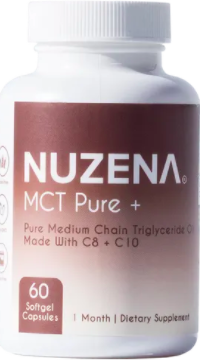
With a high dosage of medium-chain triglycerides, Nuzena’s MCT Pure+ out-performs its competitors.
Also included in the formula is capric acid, which we like because of its gut health benefits. Nuzena also boasts an MCT oil formula that is non-GMO, gluten free and vegan friendly.
We found Nuzena to have an impressive reputation for customer care. Their products are quality certified, with real time quality reports and providing access to registered dieticians for their customers.
Nuzena’s MCT Pure is a fantastic product that covers all aspects when looking for a product to aid in weight loss, energy or support with diabetes.
2. Team Keto PURE C8 MCT Oil Powder
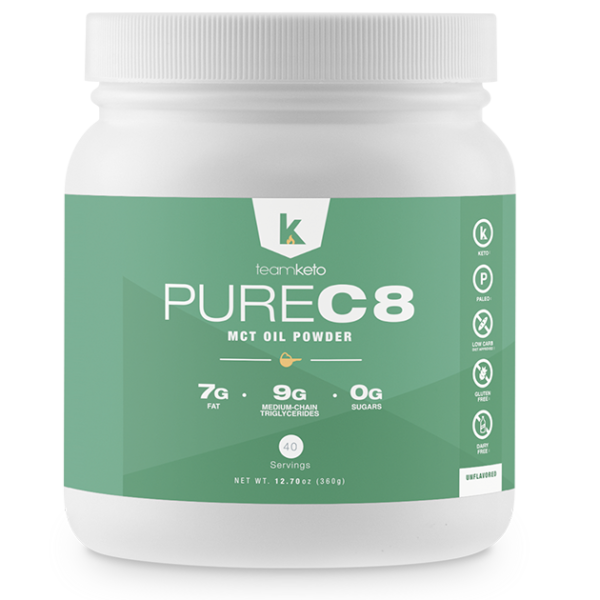
Click here for the lowest price
PURE C8 is made by the true ketogenic brand, Team Keto, and it’s brilliant.
Containing 100% C8, this MCT powder delivers the single most ketogenic-friendly medium chain triglyceride and nothing else. That means cleaner energy, no aftertaste, and an ultra-pure powder.
What we really like about this MCT product is that its in a mixable powder. This allows C8 to be used in cooking as well as beverages, mixing seamlessly with most things.
Whether you like MCT oil in your coffee, smoothies, or added to a meal; Team Keto PURE C8 delivers the single most effective MCT for maintaining ketosis and burning excess weight.
3. Performance Lab MCT Oil
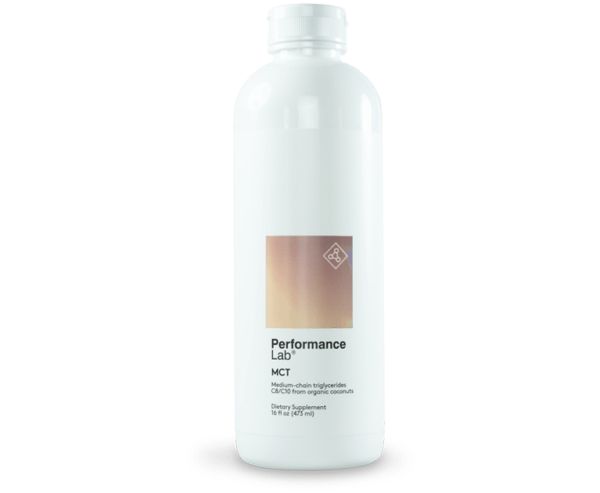
Click here for the lowest price
Performance Lab MCT oil is easily a top-3 option.
100% organic non-GMO coconuts.
Ultra-clean and undiluted, it features only the most effective MCTs – C8 and C10. Calibrated to 60% and 40% and triple distilled for maximum potency and purity.
It’s flavour-neutral, with no nasty odor or after taste. In a handy spill-free bottle that makes it perfect for coffee, smoothies, cereals and salads.
Clean, convenient, fast-acting super fuel that fits with all diets and fat loss programs – including keto.
4. Sports Research MCT Oil
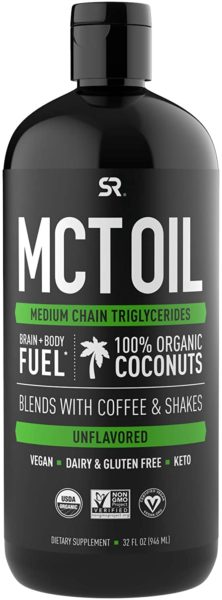
The MCT oil made by Sports Research comes in a generously-sized 32 oz bottle that’s BPA free, and its only ingredient is MCT oil from coconuts that are certified non-GMO.
With ratios of caprylic acid, capric acid, and lauric acid that are nearly 1:1:1, it’s a great balance of the primary medium chain triglycerides.
5. Viva Naturals MCT Oil
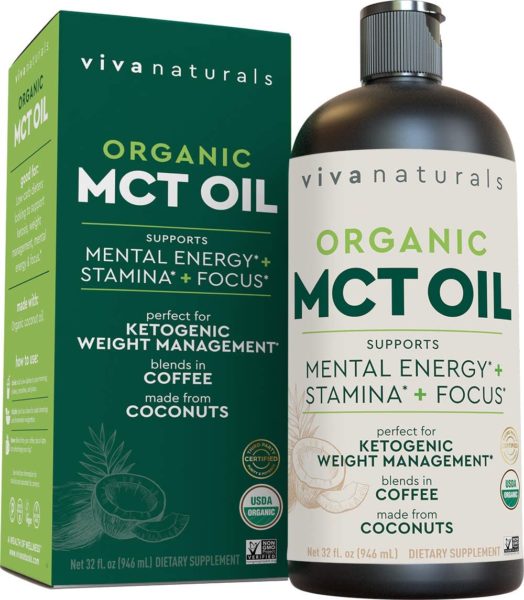
Straight, simple, and to the point–Viva Naturals makes an MCT oil supplement that comes in a 32 ounce squeezable bottle and that uses solely coconut oil in its manufacturing process.
Cheaper MCT oils might rely on palm oil to balance out the formula, but not Viva Naturals.
6. Left Coast Performance MCT Oil
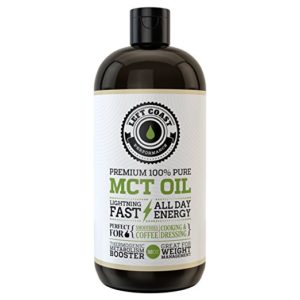
Left Coast Performance makes an excellent MCT oil that really drives hard to deliver capric and caprylic acid (the “C8” and “C10” MCT oils).
Almost all of the fat in this liquid oil supplement is comprised of these two MCT oils, leaving very little lauric acid in the formulation. It’s made in America from coconuts grown in Malaysia, and it’s non-GMO certified.
7. Garden of Life MCT Oil
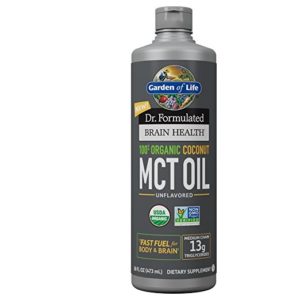
Garden of Life always goes out of its way to distinguish itself, and in the case of their MCT oil, they do so by making sure the coconuts that are the sole source of the MCT oil in this supplement are organically sourced.
If organically-produced ingredients are a priority for you, Garden of Life is a great choice.
8. Onnit MCT Oil
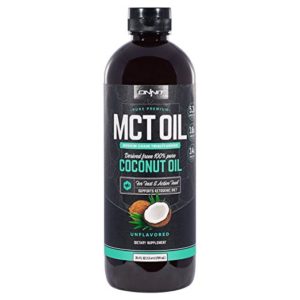
Cutting-edge supplement juggernaut Onnit is a big name in the MCT oil market, and their product is a solid formulation that provides a good supply of caprylic and capric acid without hedging too much on lauric acid–it still constitutes 30% of the total fat content in the MCT oil formula.
9. Zhou MCT Oil Powder
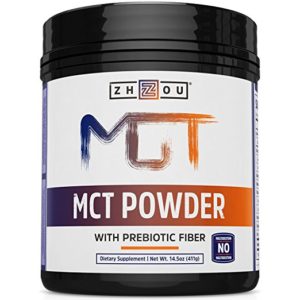
Alongside Perfect Keto, Zhou Nutrition provides the best powdered MCT oil on the market right now. With acacia fiber to solidify the MCT oil, and no bulking or anti-clumping agents like some of the other powder-based MCT oil supplements out there, it’s a great travel companion or cooking ingredient.
As with any powdered MCT oil, it is not going to blend into a smoothie as easily, and it’s going to take some stirring to get it mixed into your coffee. Still, for air travel, it’s a lifesaver.
10. Perfect Keto MCT Oil Powder
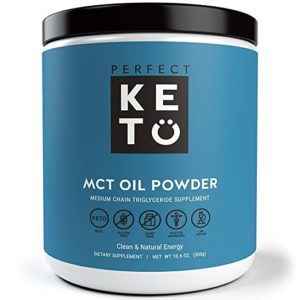
One of the better powder-based options for MCT Oil comes from Perfect Keto, which uses acacia fiber to solidify MCT oil into a powdery substance for use in baking, homemade granola, or smoothies.
It’s not as easy to use as a liquid MCT oil supplement for something like MCT oil boosted coffee or a smoothie, but the lack of mess and the ability to travel with it makes it a good investment for someone who’s on the road a lot.
11. Bulletproof Brain Octane Oil
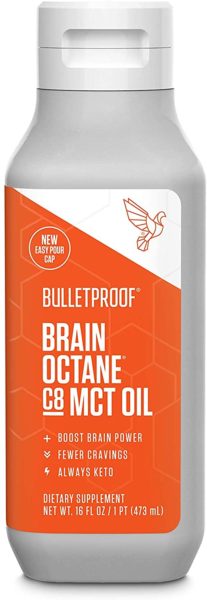
This is the MCT oil that started it all, but now that it’s caught on, other companies have pulled a bit ahead. Bulletproof focuses on delivering just caprylic and capric acid, two of the MCT oils that are thought to have the greatest health benefits.
However, the smaller bottle means you’ll have to resupply more often, and other companies have extra perks like non-GMO certification.
12. Nature’s Way MCT Oil from Coconut
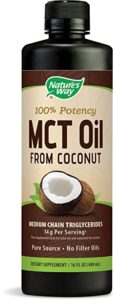
Nature’s Way makes a solid MCT oil supplement that comes in a liquid bottle, but even in its maximum bottle size, it’s a little less volume than you’d get from some of the other liquid MCT oils out there.
Still, it’s 100% MCTs from coconut oil, so it’s hard to go wrong with this one.
Category winners
Best MCT oil overall: Nuzena MCT Pure+
Nuzena MCT Pure + comes in capsule form, making it easy to incorporate into your routine even if you don’t have the time for mixing up MCT into your coffee. On top of that, the purity and ingredient sourcing is excellent, making this our overall winner.
Best MCT oil for the keto diet: Team Keto PURE C8 MCT Oil Powder
If you’re on the keto diet, you need to pump up the fat content of just about everything you eat. The powder form of Team Keto PURE C8 MCT makes it a phenomenally versatile choice for anyone doing keto or even just low-carb diets, since it vastly expands the range of foods you can enrich with MCT.
Best MCT oil for coffee: Performance Lab MCT Oil
Performance Lab MCT Oil is ultra-pure, comes in liquid form, and has a nice mild taste to it. Unlike overly acidic or acrid-tasting oils, Performance Lab pairs well with all types and roasts of coffee.
Best MCT oil for weight loss: Team Keto PURE C8 MCT Oil Powder
Leveraging MCT oil’s thermogenic effects? Team Keto is a great choice, as it’s easy to mix into liquids or solids, and makes for mess-free supplementation without making big sacrifices on purity.
Best MCT oil athletes: Nuzena MCT Pure+
Athletes taking advantage of the benefits of MCT oil want to control their dosage precisely and make sure their supplement doesn’t cause any unwanted gastrointestinal side effects. For both reasons, Nuzena MCT Pure + is the perfect choice for performance.
Best MCT oil for skin: Viva Naturals MCT Oil
To let your skin benefit from the moisturizing and protecting effects of MCT oil, you want a product that comes in bulk, but doesn’t sacrifice when it comes to purity. Viva Naturals MCT Oil is the right call on this front, thanks to its purity and the large bottle’s ease of use.
Who should buy MCT oil?
Medium chain triglyceride oil, or MCT oil for short, is a favorite supplement among people on ketogenic diets, but its use isn’t restricted to just people on low carb diets.
MCT oil has been consistently shown to have unique properties that are not shared by more general sources of dietary fats, such as olive oil or even the raw coconut oil from which MCT oil is derived.
It can be protective against the negative effects of obesity, and can fight systemic inflammation as well. MCT oil also acts directly on neurotransmitter receptors in your brain, which could help it enhance cognitive performance and slow cognitive decline.
MCT oil is also an ingredient in the classic recipe for bulletproof coffee, which is reputed to stave off hunger and give you an extra boost of energy in the morning.
While these broad-based benefits seem suspicious, there is strong biological evidence supporting a precise mechanism for all of these benefits.
For example, researchers have identified specific binding sites in the brain that are targeted by medium chain triglycerides, and experimental data has verified the differential effects of MCT oil on satiety (fullness) and levels of blood lipids.
In short, if you want to boost your short-term cognitive performance and improve your long-term health, MCT oil is a great supplement to add to your daily routine.
How we ranked
When it comes to MCT oil, purity is king. For this reason, we didn’t even consider products that used MCT oil as a secondary ingredient, or included MCT oil alongside other potentially beneficial oils.
We only looked at products whose sole purpose was delivering MCT oil. These products are more effective and make dosing a lot easier. That’s important if you are trying to mirror the dosage protocols used in clinical research.
The next major point of differentiation between MCT oil products is whether the product comes in a liquid form or in a powder. In its natural, unprocessed form, MCT oil will be a liquid at room temperature—its melting point is between 30 and 50 degrees Fahrenheit, depending on the precise composition.
However, liquid MCT oil can get a little messy, so with a little processing, it’s possible to make MCT oil into a powder at room temperature.
Powders can be a little easier to use and to measure out dosages, but the downside is that you have a few extra ingredients to bind and stabilize the MCT oil into powder form. Additionally, if a tub of MCT oil powder gets too hot (for example, if you leave it in your car on a hot summer day), it can melt, which wrecks the benefits of the powder form.
We found strong candidates for both liquid and solid forms of MCT oil, so they’re both well-represented in our rankings.
Next, we looked to see which products offered perks like non-GMO certifications or oils derived from organically grown ingredients. While these aren’t absolutely critical, they are still nice to see, and are good indicators of overall product quality.
Likewise, we also considered the initial plant source of the MCT oil. Coconut oil is thought to have better health properties than palm oil, though palm oil is a lot cheaper. With our focus on quality, products that used coconut oil exclusively scored better than mixed coconut and palm oil products.
Finally, we aggregated the remaining products and ranked them based on a weighted average of markers of quality, like organic certification, MCT oil source, and (for solid form products) the other ingredients used to solidify the oil. The final results represent the best sources of MCT oil available right now.
Benefits
MCT oil is incredibly versatile. It’s rare for a supplement to get wildly popular for health benefits, weight loss, and exercise performance, but MCT oil appears to have done so.
With plenty of scientific research continuing to come out in support of the health benefits of medium chain triglycerides, and the sea change in the stance of nutritionists when it comes to plant-derived saturated fats, don’t expect MCT oil to fade away any time soon.
How is it possible for MCT oil to have benefits across so many different categories, and why doesn’t it get thrown in the “bad food” bin with most other sources of saturated fat? We’ll dig into the science to uncover the answers.
MCT oil is different from other saturated fats. Saturated fats have been much maligned for their tendency to increase biomarkers that are associated with increased risk of heart disease, and an increase in risk for metabolic syndrome as well.
But scientific research shows that MCT oil doesn’t have the same properties as other saturated fats–in fact, it appears it is beneficial with regards to your risk factors for heart disease and metabolic syndrome.
One study published in 2008 studied whether MCT oil would increase risk factors for metabolic syndrome compared to olive oil, the “gold standard” healthy oil that’s commonly recommended for heart and metabolic health (1).
Participants in the study were randomly assigned to a diet that contained 12% of its caloric content either from olive oil or from MCT oil. The standard American diet only contains about 2% of its calories in the form of MCT oil, so this represents a substantial increase.
The subjects were followed for four months. All of the subjects were overweight or obese, and several of them already had metabolic syndrome (high blood pressure combined with high blood sugar levels). After the researchers collected and analyzed the data, they found no changes in risk factors for metabolic syndrome in the group that consumed MCT oil.
In fact, all of the subjects in the MCT oil group who had metabolic syndrome at the beginning of the study did not have it anymore at the end.
This was the case for a few of the subjects in the olive oil group, but a few olive oil consumers went from healthy to having metabolic syndrome too.
As far as heart disease, there is even more robust evidence supporting the idea that MCT oils are processed differently by your body compared to other saturated fats.
A very large long-term study on nurses published in 1999 drew the distinction between medium chain triglycerides and long chain triglycerides like those found in animal products (2).
After adjusting for factors like age, smoking, and other potential confounding variables, the study found that medium chain triglyceride consumption did not increase risk for heart disease, while long-chain triglyceride consumption did.
MCT oil can help with weight loss. More concrete evidence for the health benefits of MCT oil as it relates to weight loss comes from a 2010 research article in the scientific journal Pharmacological Research (3).
In it, the authors cite several research papers that illustrate how MCT oil can help you lose weight. Several early studies in rats showed the weight loss potential for MCT oil: rats fed an MCT oil rich diet showed a decrease in fat deposition and an increase in thermogenesis, i.e. the body’s metabolism (see: thermogenics).
Later studies tried to translate this success into studies in humans, and the results were equally impressive. When obese people are given a meal that’s enriched with MCT oil, their energy expenditure after the meal increases significantly compared to if the same amount of calories were added to the meal using long-chain fats.
Many studies have been conducted on MCT oils for weight loss, but in 2015, researchers in Australia pooled the results of 13 different trials totalling almost 800 subjects (4).
After pooling the data, the researchers found strong evidence that MCT oil supplementation leads to decreases in body weight, waist circumference, hip circumference, and total body fat content.
As with other weight loss supplements, your weight loss results will definitely be better along with reforms to your dieting and exercise habits, but MCT oil’s effects are definitely strong enough, and its ancillary health benefits are attractive enough, to consider it a cornerstone of a successful weight loss program.
MCT oil could help enhance athletic performance. Interestingly, MCT oil might even provide performance benefits to athletes. This was the claim of a 2009 study on recreational cyclists (5).
The subjects were given a 6 gram per day MCT oil supplement for two weeks, then completed a cycling time trial. The subjects given the MCT oil were able to cycle longer and harder compared to those given a long chain triglyceride supplement.
The researchers hypothesized that the MCT oil had increased the body’s ability to burn fat as fuel during high-intensity exercise, leading to better performance because of the increased energy available.
Some research suggests that MCT oil could improve cognitive function in people with mild cognitive decline. In older adults with mild dementia or early-stage Alzheimer’s disease, one of the hallmark changes is a decline in the brain’s ability to use glucose for energy.
Some early research suggests that MCT oil could be a useful supplementation strategy to blunt some of the negative impacts of this change.
A paper published in 2015 demonstrated that an MCT oil supplement could lead to a significant improvement in cognitive ability among adults with mild cognitive impairment, compared to a placebo supplement (6).
This finding is in line with earlier research suggesting a small but significant effect of MCT oil on cognitive functioning in older adults (7).
These findings are significant because they are bolstered by evidence pointing to a specific mechanism of action in the brain: MCT oil molecules provide energy to neurons through an alternative mechanism than glucose metabolism, and as such, allow higher cognitive functioning than would otherwise be possible.
MCT oil may also help boost the cognitive performance of healthy people, but this is relatively untested in the scientific literature. Based on the understanding of the mechanism behind the potential benefits of MCT oil on cognitive decline, it’s only natural to wonder if the same mechanism can help increase cognitive function in healthy people, as nootropic supplements do.
Though there is evidence that specific MCT molecules and their metabolites can improve cognitive function in older adults with early stage dementia or mild cognitive impairment (8), relatively little research has tested whether this same function applies to healthy people.
While the mechanism makes sense, rigorous research has not been done to test this hypothesis—for understandable reasons, there is far more funding for research into Alzheimer’s disease than there is for research into nootropic cognitive enhancement.
Side effects
Overuse of MCT oil can lead to diarrhea and loose stools, as well as nausea and vomiting in rarer cases. These side effects have been well-known for many years, because one of MCT oil’s earlier use was as a major portion of the calories in ketogenic diets for seizure control (9).
However, at the doses that are most effective for MCT oil’s weight loss and health benefits, these side effects are rare.
There are two strategies you can use to reduce the incidence of side effects if you are having problems. The first is adaptation: if a 12 gram dose of MCT oil causes gastrointestinal problems, you can start with a smaller dose–maybe 3 or 4 grams per day.
Then, over the course of a few weeks, you can work your way up to 12 grams. The other strategy is taking MCT oil with food, which seems to help control gastrointestinal problems, especially if you are taking higher doses of MCT oil.
One other consideration is how you store your MCT oil–while it won’t necessarily cause side effects, you shouldn’t’ store your MCT oil near a window that will expose it to direct sunlight, especially if you have an MCT oil supplement that doesn’t have an opaque container.
MCT oil also shouldn’t be refrigerated. The cold won’t damage it, but it will solidify, making it much more difficult to measure out the right dosage and to mix it into your food or beverage of choice.
Recommended Dosage
Although there has been an explosion of studies on MCT oil for everything from weight loss to treating cardiovascular disease to improving athletic performance, there isn’t a clear consensus on what the optimal dose is.
For now, the best route is to copy the protocols of the most successful scientific studies, since these are where the best results have been demonstrated.
Studies range from 5 to 20 grams of MCT oil per day, but right around 10-14 seems to be the midrange of the optimal dosage.
This is enough of a dosage to result in all of the positive health benefits of MCT oil, but should be low enough for most people to avoid some of the gastrointestinal side effects.
FAQ
Q: What is MCT oil?
A: MCT oil, or medium chain triglyceride oil, is a special preparation of certain kinds of saturated that are found in plant oils, most commonly palm oil and coconut oil.
These MCT oils belong to a narrow band of the wide range of molecular structures found in fatty acids, and they are thought to have special benefits for health. MCT oils are common in saturated fat from dairy, but rare in saturated fat from animal meat (e.g. a fatty cut of beef).
While older nutritional research lumped all saturated fats into the same category, newer research is recognizing that MCT oils have distinct benefits, even when compared to other fatty acids found in the same food sources.
Q: What is the difference between MCT oil and coconut oil?
A: MCT oils are found in coconut oil, but there are also other kinds of oils in coconut oil. Making coconut oil is fairly easy—all you have to do is press the dried flesh of the coconut.
However, this coconut oil will contain MCT alongside other kinds of oils (both saturated and unsaturated fats).
While coconut oil itself is thought to have many health benefits (not to mention broad uses in cosmetics), MCT oils have special chemical properties that make them more desirable.
Q: Can MCT oil help you lose weight?
A: Quite a bit of research has been dedicated to MCT as a possible weight loss supplement. Large meta-analysis studies have concluded that MCT oil can lead to weight loss, especially when they replace long-chain triglycerides in your diet (10).
The benefits have been traced to a variety of mechanisms, including an increased feeling of satiety (or fullness), which would mean that MCT oils acts as an appetite suppressant, but also to an increase in fat oxidation after consuming MCT oil.
This would indicate a shift in metabolic energy preferences towards sources of fuel that are more conducive to weight loss.
Q: Is MCT oil good in coffee?
A: MCT oil is the original “secret ingredient” in bulletproof coffee. While other formulations use coconut oil, grass-fed butter, or other sources of healthy fats, the mechanism is more or less the same.
The ingenuity of bulletproof coffee was the combination of caffeine and a source of medium chain triglycerides.
Caffeine is known to increase fat oxidation, and boost the function of your central nervous system. MCT oils are fatty acids that are easily oxidized for energy, and are particularly useful for burning in—you guessed it—your brain, which is is the most important part of the central nervous system.
MCT oil lets you fuel up your brain without the spike in blood sugar that you’d normally get with a carb-heavy breakfast.
Q: Does MCT oil help with the keto diet?
A: MCT oil is incredibly popular among keto adherents because of its ability to provide fuel for your body in a way that does not pull you out of ketosis.
It’s one of the few ways keto dieters can boost fat oxidation and potentially improve cognitive function without risking metabolic function. MCT oil is particularly easy for your body to process into ketone bodies, which explains why MCT oil got its initial boost in popularity from keto diet and low-carb diet enthusiasts.
Q: How do you use MCT oil?
A: Most dosage recommendations suggest that taking 10 to 14 grams of MCT oil per day is the best way to gain most of the benefits while keeping the risk of gastrointestinal side effects to a minimum.
Many people prefer to split their MCT oil dosage into more than one dose taken throughout the day. MCT oil can be added to a protein shake, added to solid foods like oatmeal, or put in coffee or tea. While some people will take MCT “shots” of pure liquid, it’s definitely not for everyone; mixing it into something else makes it go down a lot easier.
Q: How much MCT oil should you take for weight loss?
A: Most studies of MCT oil for weight loss have concentrated on doses of 5 to 20 grams per day. However, while a meta-analysis noted that MCT oil has consistent benefits when it is used to replace other sources of dietary fat, the research conducted so far is not comprehensive enough to identify what dosage is ideal for specific weight loss goals (11).
Most experts recommend starting with a low dose, maybe two or three grams per day, and working your way up over the course of a few weeks to 10-14 grams per day. That’s the dosage range that most of the research has been concentrated at, although a few outlier studies have used larger doses.
Q: Is MCT oil useful for intermittent fasting?
A: MCT oil is popular for the newly popular practice of intermittent fasting thanks to its ability to provide your body with fuel without causing a spike in blood sugar or insulin.
A large part of any benefits of intermittent fasting can be ascribed to its ability to put your body into long bouts of reliance on fat for energy; during these periods, fat oxidation increases.
MCT oil, being an easily-oxidized fat that is known to increase your body’s reliance on fat for metabolic energy, is a natural choice.
Coffee with a few teaspoons of MCT oil is perhaps the classic morning routine for someone who does intermittent fasting. MCT oil won’t shoot up your blood sugar like a large bowl of cereal or even a meal replacement shake would.
Q: How is MCT oil made?
A: MCT oil is usually made from a natural source of triglycerides that is high in medium chain triglycerides. Commercially, the two most popular sources are coconut oil and palm oil.
These oils need to be refined before they can be turned into MCT oil, though. That’s because these oils also contain long-chain triglycerides, which have different chemical properties.
The medium chain triglycerides are isolated through a process called fractional distillation. The raw oils are heated in a tall column with careful temperature control; the medium chain triglycerides concentrate at a particular place in the distillation column, and can be extracted cleanly and separated from the lighter and heavier molecules present in raw coconut or palm oil.
Q: Why does MCT oil cause diarrhea?
A: MCT oil is often thought to cause some gastrointestinal disturbances like diarrhea, though the specific action of MCT oil might be overblown.
Oil intake generally, whether it’s olive oil or MCT oil, can stimulate diarrhea or have a laxative effect. Moreover, coffee (a common delivery vehicle for MCT) can stimulate or irritate your gastrointestinal tract.
Some clinical studies do report gastrointestinal irritation as a potential side effect of MCT oil treatment, but these adverse effects generally get better over time.
You can try splitting your MCT oil dose into multiple smaller doses taken throughout the day, or starting out at a lower dose and gradually increasing it over time.
Related articles
Recap
MCT oil is an incredibly popular supplement, and for good reason. There’s an impressive body of scientific evidence supporting its use as a health supplement to decrease risk factors for metabolic syndrome and heart disease, as well as strong support for its weight loss benefits.
It can help you lose weight, decrease your waist size, and improve your metabolic health all at the same time. On top of this, it might even be effective as a performance enhancer for endurance athletes.
The only major side effects of MCT oil use are gastrointestinal problems, and they are rare at the doses used in scientific research studies.
It’s likely that studies on MCT oil’s benefits will continue to roll in as its potential for treating and preventing other health conditions is explored.
For BodyNutrition‘s #1 MCT oil recommendation, click here.